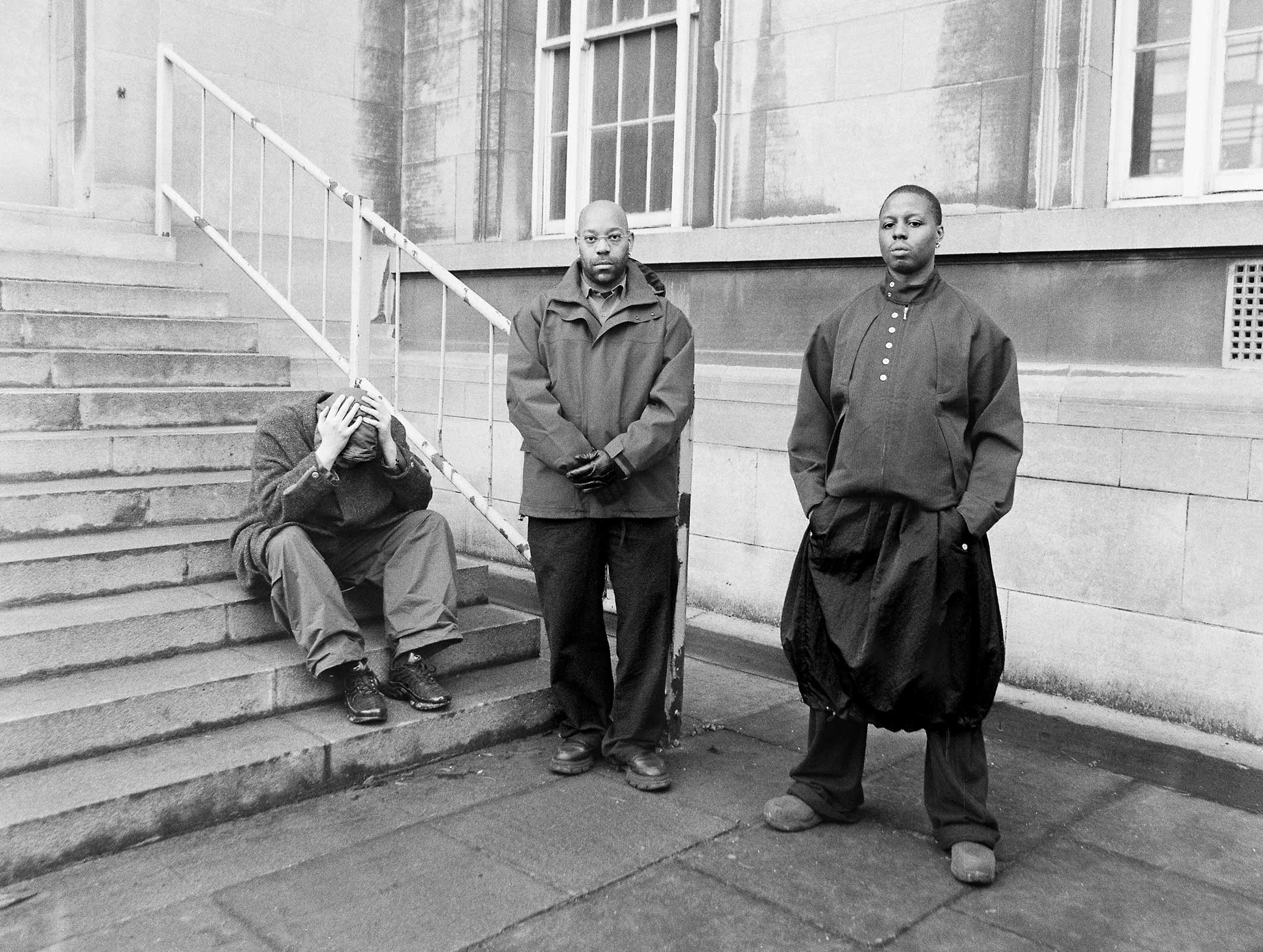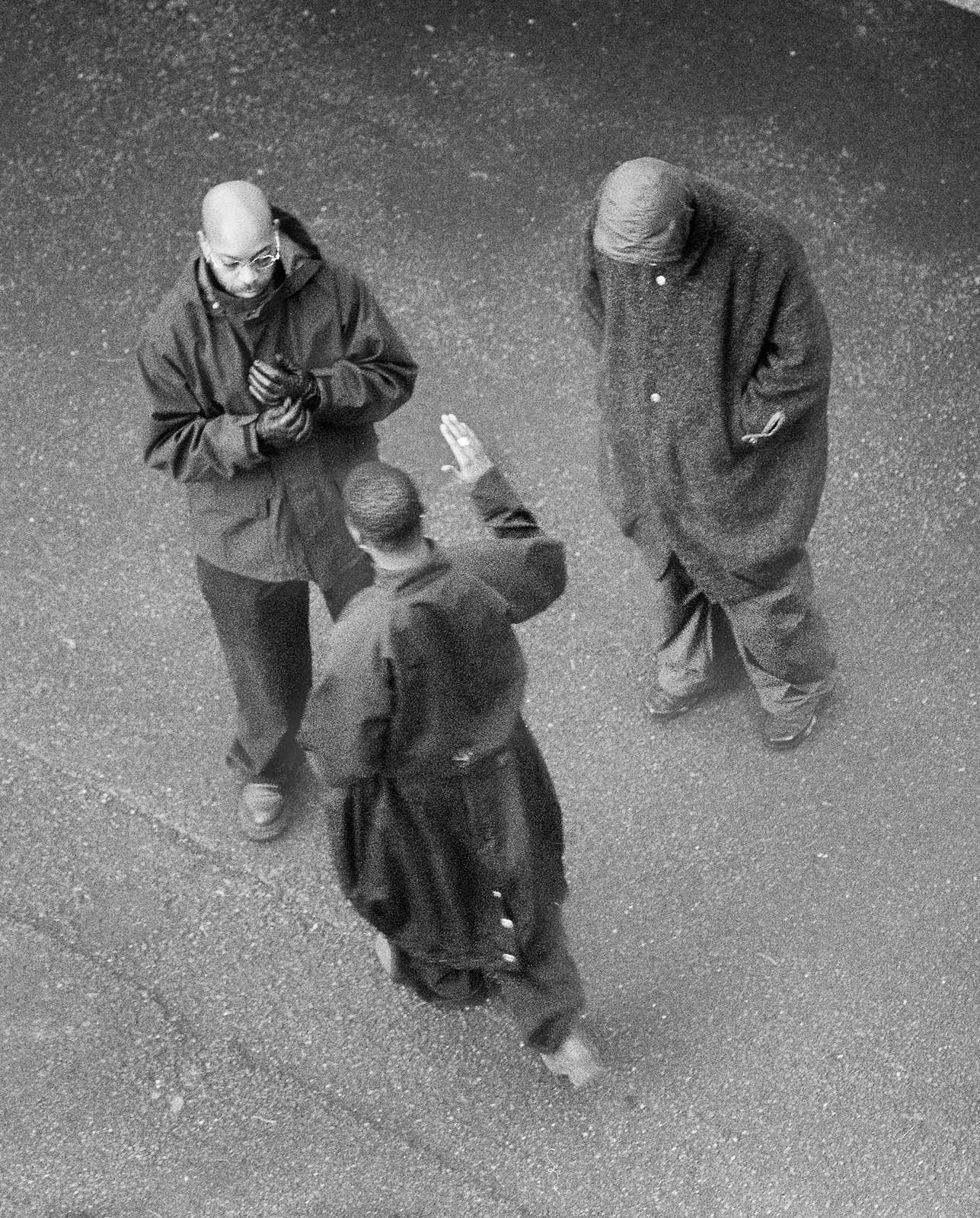The artists’ joint record ‘A Grisaille Wedding’ is guided by mutual trust, North West heritage, and a quick-on-the-draw spirit
A Grisaille Wedding isn’t just a record. It’s a fragment of a still-evolving world. It’s a tangible piece of a community, the roots of which are built from Rainy Miller and Space Afrika. It’s a world inarguably born from locality, as the Preston-based artist and Manchester-born duo wear their North West heritage in their persisting experimental spirit, unburdened by pressures to fit the mold of more global cities’ creative scenes. Their geography made them, but, they insist, it will never define them.
The record is a full-bodied platform upon which these artists engage in long-form collaboration—because this world is made mostly of relationships: those between Space Afrika’s Joshua Inyang and Joshua Tarelle Reid; their shared and separate bonds with Miller; and the many that branch and intertwine from the three and their slew of collaborators—those formative to their creative network like Blackhaine, and those directly involved in the release, including Mica Levi, Coby Sey, Voice Actor, Richie Culver, RenzNiro, BobbieOrkid, and Iceboy Violet.
It’s those very relationships that drive the light that peeks through on A Grisaille Wedding. Each track carries the same emotional weight that rendered their respective earlier works resonant, only this time, they’re intentionally complicated by flickers of love and joy. It’s intimacy in thought that breeds creativity and clarity. “Trust guides bold and lawless production, which feels like a perfect celebration of each of our more intricate skills, leading first with fun and second with ambition, without hesitation,” Space Afrika offered in a release. “In its moments, it is romantic, harsh and revealing. A controlled drama, and catharsis allowing room for progressive ideas.”
Upon the release of A Grisaille Wedding, Miller and Inyang join Document to expound upon their relationship—as friends, as collaborators, and as sources of mutual inspiration.
“The majority of what we both do is translating our experiences into some sort of relatable context—in fact, that’s exactly what we do.”
Megan Hullander: You’ve spoken before about the importance of trust. How do you balance the letting go that comes with that, while still ensuring the project feels cohesive?
Joshua Inyang: We’re very careful with who we work with and how we work. Before we jump into bed with anyone new, they’ve pretty much already been vetted—we know each other’s spirits and attitudes. We’re fortunate that we’re similar in terms of how we operate. The fruits of what came out of that spoke for themselves. Trusting that vision and trusting that energy has been really easy.
Rainy Miller: We had sketched out this record, and we were looking at the things we’d need to plug the gaps as to who would fit contextually with what we wanted. We picked these people specifically for these roles on the record; it all went back to very early conversations about what we loved the most about music. We bonded over Kanye West’s curation, where the size of the artists didn’t matter—it’s [about] who fit. We’re lucky to have a network that sends us things and trusts us to put them in the right places.
Megan: What does that world-building look like, in terms of process?
Joshua: I feel like a lot of the world-building comes naturally. We had a show in Paris, which was a moment for all of us. It was a joint show—we were sharing the stage with giants, people who we admire. And likewise, they were admiring what we do. It [turned into] friendship. I’m grateful for that. It helps you be honest in your artistic exchanges.
Rainy: I wanted to lean into the world that Space Afrika made—the whole fabric of it. I wanted to add a bit of vocal-driven narrative and create more of a story—something more semi-fictional. But it’s funny, because there’s that real tangibility. It’s between this semi-fictitious world and those moments like the Paris show; there are tangible results from both that kind of leak into each other.
Megan: Do you think that fictionalization is mostly a means of protecting yourself, or is it that there are ways that fiction sometimes feels more accurate to reality than fact?
Joshua: I think the majority of what we both do is translating our experiences into some sort of relatable context—in fact, that’s exactly what we do. I think when you tell stories, fact or fiction, you inject some sort of additional energy into them. When you convert something from your life into a song, the additional elements—the drums or someone else’s vocals—are someone’s angle or idea to the stories that you’re building.
Rainy: In a lot of the music we make, we dig deep into ourselves, and I think a lot of it has always been extracted from a little bit of pain, a little bit of trauma. Sometimes it’s too much, it’s a bit too raw to put forward. So you dress it, you shroud yourself with this blanket of security, you cloak meanings, you translate that human experience in a way that you can preserve yourself.
There’s a track on the record, ‘Let it Die,’ and I can’t perform that song without weeping. Happens every time. We’ve done shows together where we’ve come up in tears, because the music we make cuts to the bone. And we put a lot of ourselves in there—in very different ways, because, obviously, we’ve lived completely different lives. That’s how we translate them. It’s the reason we make music. You dress it up because it’s so impossible to spill everything as it is. But that’s what makes the stories great. It lets people translate them themselves—they’re like puzzles.
Joshua: Sometimes you’re bearing or dealing with or exorcizing a demon, and it’s not always intentional that you cloud it. It’s just the way it is.
Megan: Despite the pain you reference, you’ve said that this record was an attempt at looking for light. Is that something you’ve been able to do in your life, or was the album more of an exercise in doing that?
Rainy: It was a driving force behind the record, I think. Firstly, because of how we’ve been represented—not just me and Josh, but [also] the people around us who’ve been making similar things, who are involved in the same conversations. We’ve been pigeonholed a bit and portrayed as these extremely political Northerners. That’s never been an intentional reason we make music. I think, naturally, there are elements of that in the music. A lot of the semantics we’re attracted to aren’t the most pleasant things, which sounds contradictory—but you can hint at these glimmers. We wanted to use them to be like, Look, we do have this positivity around us in the North. Secondly, for me, it’s about using those glimmers of hope to prepare myself for the next step, which will come from those kinds of things. But that’s the beauty of collaboration: It probably meant very different things for me and Josh.
“For me, it’s a lot braver to try to create things that have this edge of hope, something positive, silver linings.”
Joshua: It’s a positive and a negative, you get boxed in: It’s dark, it’s gloomy, we’re working-class boys, we’re taking the risk. These stories are the legacy of artists that are coming from the North West and Manchester. And fair enough, like, if you look back at the last couple records, they’ve been steeped in this strong sense of environment, locality, gloominess—working your way through difficult situations and having the record as a way to express it. The difference with this one, for me, is that the inspiration is from a place of light. We’ve made a little bit of a dent in the world. Things are in a much better place than they’d been. This is written from a place of sort of stability. Looking towards the light alludes to the fact that we still are coming from this place, we still have these stories, but there are different perspectives to be seen. And we’ve taken a lot of risk in the complete confidence that we have something good going on. Looking towards the light is reaching out towards the ambitions that are more in reach. This record has been a really good exercise in that.
Megan: Do you think it’s harder to create from a place of joy than one of pain?
Joshua: It’s fascinating, isn’t it? It just depends, man. I think for me, definitely, from my experience so far, that’s what I’ve known—dealing with shit. Without that, I would not be where we’re at.
Rainy: I think the reason we both got into music was for that catharsis, and wanting to actually be expelled. It’s like therapy, because we’ve had things in our hearts, in our minds, that we wanted to write about. People don’t want to revel in other people doing great or feeling good. Perspectives are shifting, and we’re getting older, and we’re seeing things in lights that aren’t as glorified as being dark and angsty. Trends just tend to negate stuff that tends to be a bit darker, because the world’s in a bit of a fuckin’ shocking place. You can have that when you’re in your mid-20s and it’s everything you live for, but you have to grow up. It’s such an easy trope to lean on, because it’s the only trope that the world ever really wants to crown. For me, it’s a lot braver to try to create things that have this edge of hope, something positive, silver linings.
Joshua: The music that we’ve written is a response to what’s going on at the time. I’m never against or stopping or questioning anyone’s story if it leans more in that direction. I’m not saying that we’re even out of that. But you don’t want to tell the same story forever—and you shouldn’t. Right now, this is the story that we’ve been able to tell that’s completely from where we’re at. And it makes sense for where we’re at.









